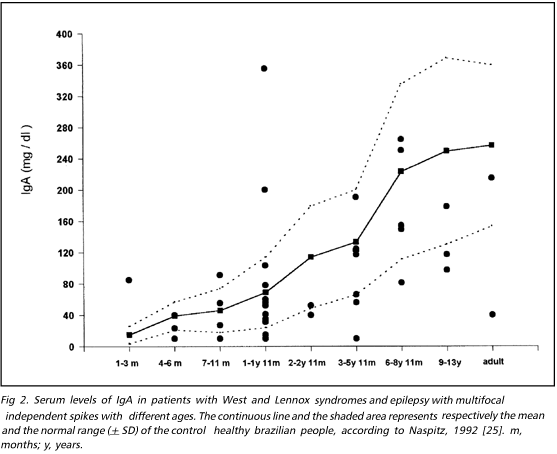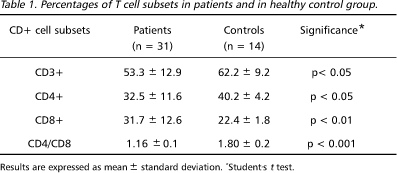STUDY OBJECTIVE: The purpose of this study was to assess the extent of immune dysfunction in a well-defined group of epileptic patients: children with diagnosis of West syndrome (WS) or with transitions to another age-related EEG patterns, the multifocal independent spikes (MIS), and the slow spike-wave complexes (Lennox-Gastaut syndrome - LGS). Thus, WS was studied at different points of the natural evolutive history of the disease. METHOD: A group of 50 patients (33 with WS, 10 with LGS and 7 with MIS) and 20 age-matched healthy controls were submitted to enumeration of T lymphocyte subsets: CD1, CD3, CD4, CD8, CD4/CD8 ratio and lymphocyte proliferation assay to phytohaemagglutinin (PHA), in the presence of autologous and AB, homologous plasma. Dinitrochlorobenzene (DNCB) skin test sensitization was performed only in patients. Determinations of IgG, IgA, and IgM serum levels were compared to standard values for Brazilian population in different age ranges. RESULTS: Sensitization to DNCB showed absent or low skin reactions in 76% of the patients. High levels of IgG (45.7%) and IgM (61.4%), and lower levels of IgA (23.9%) were detected in the serum of the patients. Enumeration of lymphocyte subsets in peripheral blood showed: low CD3+ (p<0.05), low CD4+ (p<0.05), high CD8+ (p<0.01) and low CD4+ / CD8+ ratio (p<0.001). The proportion of CD1+ cells in the control group was less than 3%, while ranged between 6 and 11 % in 18% of the patients. The in vitro PHA-induced T cell proliferation showed significantly low blastogenic indices only when patients, cells were cultured in presence of their own plasma. No differences in blastogenic indices were observed when the cells of patients and controls were cultured with human AB plasma. CONCLUSION: The immunodeficiency in WS was mainly characterized by anergy, impaired cell-mediated immunity, altered levels of immunoglobulins, presence of immature thymocytes in peripheral blood and functional impairment of T lymphocytes induced by plasma inhibitory factors.
dinitrochlorobenzene; West syndrome; Lennox-Gastaut syndrome; multifocal-independent spike syndrome; T-lymphocytes subsets; immunoglobulins; proliferation assay; T cells; CD1; CD3; CD4; CD8





